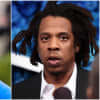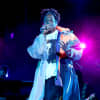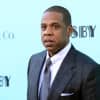The 40/40 Club is built out a bit like a time capsule for an era passed: with its hall of autographed throwback jerseys and towers of gold and glass rising to the ceiling, it's a bit gaudy and a touch intimidating. The whole thing looks like one big VIP section, which may be why Jay Z and TIDAL gathered together a bunch of media people last Saturday for finger foods and champagne at the luxury sports bar to gear up for his invite-only "B-Sides" concert, advertised as an intimate show that would feature never-before-performed songs from the rapper's extensive back catalogue. The theme of the evening seemed to be the privilege of access, be it to a once-in-a-fandom setlist, a premium music listening experience, or the roped-off section of a club.
We were shuttled via Benz sprinter to the venue, and whisked onto a VIP balcony as the house floor filled to the walls. A sprawling band tuned up on-stage while someone struggled unforgivably with the house music, Vic Mensa's "U Mad" blanking in and out like a televised Kanye performance. Soon, Young Guru and Just Blaze stepped up for twin control of the turntables, the band cued up "The Dynasty (Intro)," and a publicist watching from the soundboard cupped her mouth nervously. Jay emerged and launched into what felt like a 90-minute game of name-that-tune: to give you an idea of how deep things went, his third song was his 2003 Joe Budden diss. The set was heavy on cuts from his debut album Reasonable Doubt, his pinnacle Blueprint, and the formative Volumes he spent perfecting his style between them. There was no "Hard Knock Life," no "Young Forever," no "Empire State of Mind." State Property reunited, including a healthy looking Beanie Sigel, who was recently hospitalized for gunshot wounds, and fans in the crowd competed to see who could rap along most thoroughly: after spitting his Hot 97 "Grammy Family" freestyle, Jay Z quipped, "We had a bet that nobody in here would know that."
It was a brilliant show from a veteran performer, and an unforgettable night for anyone who would consider themselves a fan. However, the most talked-about moment from the evening wasn't a dusted-off gem or surprise guest, but an a cappella freestyle in which Jay accused TIDAL's critics of subtle racism, controversially invoking the murders of Freddie Gray and Mike Brown to contextualize his own business aspirations. "So I hear I'm the bad guy now," he started, before wagging his finger: Oh, niggas is skeptical when its their own shit/ You bought nine iPhones and Steve Jobs was rich... The only one they hating on look the same as you. The pointed freestyle leaned on painful imagery and shaming rhetoric as a roundabout means of engendering trust from his community. This seemed to be the concert's overall aim as well: Jay Z wielding his most beloved material as an olive branch to his diehards and day-ones, as if to say, "I made 'A Million And One Questions,' y'all, remember? You can trust me."
It's hard to say when Hov lost his core audiences' trust, but his business ventures will continue to be met with scorn until he can gain it back. I remember being fourteen and hearing my parents chide Jay and Dame for charging $300 for an MP3 player, knowing that many of his biggest fans couldn't afford it. Today, a similar smear-campaign prevails against TIDAL, with Jay offering fans the most expensive music streaming service plan on the market, only to find himself in the middle of a very different cultural climate and purchasing environment. The internet has given consumers a much more discerning eye for authenticity and inherent value—particularly for the stuff they purchase, download, and subscribe to on the web. From memes to MP3s to MyIdol, the most beloved web stuff starts small. We feel most ownership over, and invest most deeply in, the things we know our peers likely do not: an artist we were up on first, a rare freestyle only true fans know, or a link all our friends haven't already gotten to.
TIDAL's first step was its misstep. The image of a dozen mega-stars standing shoulder-to-shoulder is etched in our brains, and it seemed like the kind of a strategy that might've worked for Jay when Vol. 2 was out. Jay Z's B-sides concert was a concession, the next-best appeal to fandom, and the second smartest way to reach TIDAL's ostensibly niche, music-obsessed target: fans who know "Dead Presidents" 1 and 2, who had stake in "Takeover," who were there when Jay convinced the world that there was an incredible MC on every corner in Philadelphia and that he would make them all millionaires.
It would truly be a marvel to see all the TIDAL artists follow suit, hosting intimate concerts where they perform the songs they know their true fans want to hear—J. Cole arguably started the trend, and in our recent cover story, Nicki Minaj teased the idea of a "mixtape tour" strictly for her day-one fans. "But it's hard," she told The FADER. "No matter what, you kind of need the people who know you from the mainstream to fill those venues." Jay's had a similar difficulty, and he admitted as much mid-show: "We been wanting to do this concert for about seven, ten years." In a perfect world, wouldn't every concert be a "B-sides" concert? The very concept assumes an inherent value to the consumer that the proverbial "A-side" concert does not: if this is a show where Jay Z performed his best, rarest, most beloved, most acclaimed material, then what is he performing the rest of the time?
And here's where it gets so hard to trust him, even for those who grew up on the flawless, genre-formative lyrics he performed that night. Today's music fans can tell when an artist is giving selflessly and when they are advertising selfishly: consider Golf Media, which has treated subscribers to exclusive TV shows, IRL private film screenings, a physical magazine subscription and exclusive products. Tyler's manager reported that Golf Media gained more first day subscriptions than TIDAL on their respective first days. The lesson? The internet isn't velvet roped by status, but by passion, and both are quantifiable. Those most passionate about music deserve its premium experience, and will invest where they feel they are valued. Jay Z got them all in a room; here's hoping he figures out how to talk to them.
Photo Credit: Theo Wargo/Getty Images


